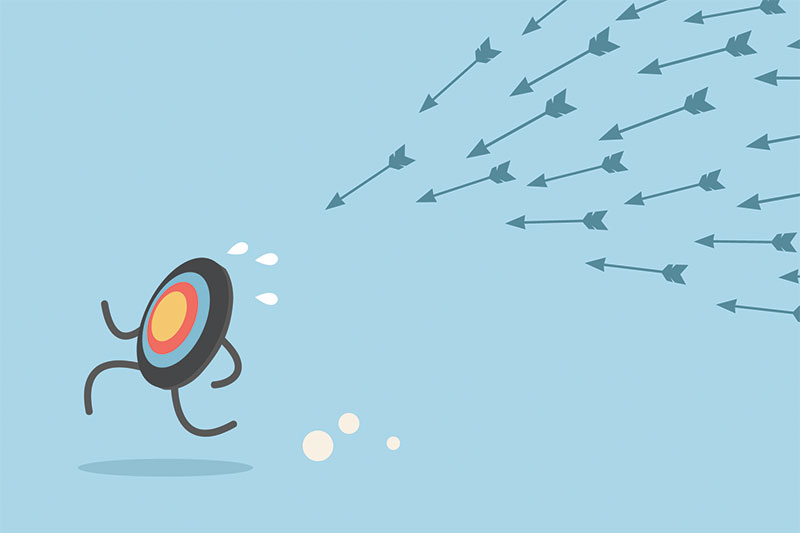The dropping of the ball on New Year’s Eve signals that age-old tradition of setting resolutions. We scan our minds thinking of the one thing we want to change in order to be a better person in the New Year. The challenge is that we know what our resolutions are—quit smoking, lose weight, start exercising, get a new job—but we don’t know why executing them is so important to us. We reply vaguely, “I just don’t want to smoke anymore,” or “I’m tired of being overweight” or “I need a new job.” While well intentioned, none of this motivates us to action.
Setting resolutions is like bowling through a curtain. We know there’s something to hit—a goal for rolling the ball down the lane—but we can’t see what we’re aiming at. So instead, we spend the next couple of weeks blindly going to the gym, purposelessly spreading out resumes and resisting the urge to smoke. By January 31, the trips to the gym are fewer, our jobs aren’t that bad, and we justify our smoking relapses.
Michael Savage, a peak performance coach with The Anthony Robbins Companies, trains people looking to make lasting change in their lives. In this interview, he talks about why you need goals, how to set them and how to stick to them.
Why don’t resolutions work?
A resolution is normally action-oriented and not outcome-oriented and lacks flexibility or emotion to create a win.
What’s the difference between a resolution and a goal?
Every year on December 31, there is a popular practice of setting resolutions. While this is admirable, a goal has components that form a compelling vision which pulls us towards it. We set a resolution without making them come alive. We must learn to set S.M.A.R.T goals—Specific, Measurable, Attainable, Realistic, Timely—with clarity and with a huge why behind them.
Why should I set goals?
We live in such a fast-paced and changing world that we can get comfortable quickly. Comfort is our escape from all the change. It’s that comfort that can drown us in mediocrity. Goals are a way to consciously decide where we want to go. They keep us from being trapped. So many times we give up on our dreams for mere pennies offered in the form of incentives, signing bonuses and raises from companies that care little for us. Setting goals can keep people from falling into traps and laziness. They can re-awaken our dreams.
How should I set a goal?
We mentioned S.M.A.R.T. earlier. First, be specific. You want to lose weight? How? One pound in 30 days or 30 pounds in 3 months? Each uses a different strategy. Secondly, things need to be measurable. You can’t track what you aren’t measuring. Third, be accountable! Get someone to keep you to your word and call you on it when things aren’t going as planned. Friends are generally horrible at this. Get a personal trainer or coach—people you invest in. Fourth, be realistic! If you are earning $80,000 a year, don’t set an unreachable financial goal, especially if the basics like savings and budgeting are new for you. Start with a goal like saving 15 percent before you go for that million-dollar mark. We’re not suggesting play small, but we are suggesting that you don’t set yourself up for failure. Time stamped is fifth. Done by when? Losing 30 pounds in 30 days versus 30 pounds in 90 days takes a very different approach. Both are doable, but the time stamp dictates the action. And get them on paper! Something you can review regularly.
What level of accountability do I need to ensure success?
The best accountability is found in professional coaching. Workout buddies and trainers are great, too! One year I went on a 90-day challenge to lose 10-plus percent body fat and gain some lean muscle mass. I gave my personal trainer a $3,000 check and told him that if I missed one check-in to cash it. I will tell you, he got every check-in! Get leverage on yourself. Invest in accountability.
What do I do when discouragement hits?
Discouragement hits when you give a stumble or fall a negative meaning. You wouldn’t run 19 miles in a marathon, stop to tie your shoe and then start back at the beginning. You’d stand back up and finish the race! Hiccups happen. Give yourself permission to mess up. Also, decide that there is no turning back.
Finally, you mentioned knowing your “why.” Can you shed some light on that?
There are two factors that will give you your why—pain and pleasure. Why must you do it? What will it cost you if you don’t take the action? What has it already cost you? You build the pain! On the flip side, what will life be like when you accomplish the goal? Who will you become? How will life be different moving forward? Build the pleasure.
Goals are most powerful when tied into identity and when that identity is out future self, we can set and accomplish some powerful things. So keep that in mind and set some amazing goals for the upcoming 2014 year!
The Power of Decisions: A Case for Goals
 Tariq Johnson is the founder of LiveWithSwag, a conscious clothing line aimed at helping people reach their full potential. His journey is a blueprint for basic goal setting.
Tariq Johnson is the founder of LiveWithSwag, a conscious clothing line aimed at helping people reach their full potential. His journey is a blueprint for basic goal setting.
How did you set your goal to create your company?
It was my dream to bean entrepreneur and I found myself in a place at my job where I wanted to have more freedom and more flexibility.
How was setting this as a goal different than setting this as a resolution?
It was a decision. There are times in life where you just decide that you will make something work and there is no other way. I think resolutions are setting people up to fail before they get started. When you fully commit to doing something, it’s amazing.
What were the first steps you took to achieve your goal?
I printed up some test shirts, trademarked the name and designed the logo.
When did you decide the time was right to leave your job?
The decision came from no longer enjoying my job. I was already getting really great feedback on the shirts and when I decided that I was going to leave my job, I felt like now had to be the time. I’m the type of person where I’ve got to take the leap.
What was the scariest part about venturing on your own?
Whether or not people would be receptive and like the clothes. I also wondered if I would be able to support myself financially.
And what did you discover?
I found that some people liked and some didn’t, but that’s no different than any other product. My goal now is to focus on those who believe and buy into the brand and vision.
What are your goals for 2014?
My goals are to get into retail stores throughout the country, set up a national campaign and stage an event tour where we can go to schools all throughout the country inspiring kids and youth of all ages to go out there and live the life they truly desire.

